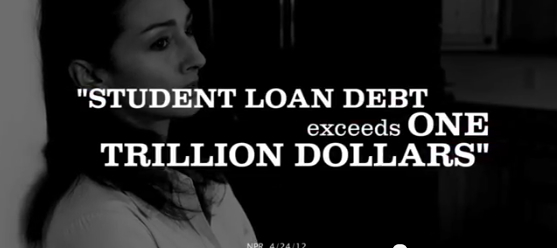For the first time at OWS you can hear the words “After May Day.” It seems almost surreal after so much planning for this day. When the events of May are over, it’s a fair bet that the global social movements will once again have the world’s attention. What will we do with this second chance? It’s time to begin imagining how to connect our issues.
So as not to lay this on anybody else, I’m going to explore this by means of the most popular topic in my own project–namely student debt–and the least, which would be climate change. How can we avoid being co-opted on the former and ignoring the latter? No answers, no demands, just questions for the Spring.
Student debt has become a viral topic in the past four months. Barely mentioned in the media until recently, it was theme of the week in the presidential and congressional elections. And what was until this week a mostly OWS slogan is now in the mix:
Yes, Mitt Romney’s Super PAC called American Crossroads has used the Occupy Student Debt slogan in an attack ad against Obama. The quote marks in this still I made from their video suggest that they even know where it comes from. The theme of the ad is that while Obama is off being a “celebrity,” real problems have been mounting for American young people.
Obama has indeed done little to mitigate the student debt crisis, although the subject was one of his most reliable applause lines in 2008. Romney has no solution at all, certainly not the one proposed by OSDC: free public education. He knows Obama won’t argue for anything like that. If this meme goes viral across the Right, we risk losing one of the most effective OWS projects.
On the other hand, from micro to macro, climate change is dropping out of sight in Occupy. When I post about it, as I noticed when I did finally look at the stats before going to Madison, readership plummets. In the Occupy global action week coming up in mid-May, climate is not mentioned at all, no doubt for fear of this alienating effect.
A news item this week seemed to encapsulate this dilemma. As I’ve mentioned a couple of times, workers at a French steel plant owned by the multinational giant ArcelorMittal have been occupying it to try and prevent its closure. However, an article in Le Monde this week clarified why the plant is not opened or closed.
This is a bit complicated, so here’s the takeaway: the steel producers are using climate change carbon credits to make a load of money for doing nothing. In more detail: under the terms of the European Union carbon trading agreement, companies were given a “free” level of pollution in 2005. Emissions would have to be paid for if they exceeded this level but a credit could be achieved by reducing them below it. ArcelorMittal has “reduced” its emissions by simply closing its plants. While some of its credits have been stored, others have been cashed in, allowing them to make $140 million in 2010: for doing nothing at all.
So if François Hollande wins the presidential election and gives ArcelorMittal an incentive to reopen the plant, it will have to be sufficiently large to exceed this free money and all the costs of actually producing. That’s not allowed by the “market,” the same market that gave all these credits to ArcelorMittal in the first place. They can cash them in, or hold the French government to ransom for a few jobs, with any actual steel production being carried out in India without tiresome regulations.
Here we see the pincer movement of financialized capital. The most widely accepted solution to the financial crisis from the Paul Krugman wing of the Democratic Party to the left is economic growth. For the green left, however, growth means more carbon emissions and accelerated climate change. For anarchists, it’s now taken as read that the current permanent expansion of capitalism must collapse because there are not infinite resources to exploit.
However, if you can capitalize total inactivity at technically an infinite rate of profit–and don’t forget all those tax deductions for the declining hardware and the savings on salary–this implosion may allow for a continued rate of profit even if there is widespread climate change.
I don’t have a simple answer to these dilemmas. I do think it suggests that a new form of affinity group is going to have to think how to cross the lines of the existing working groups to imagine a form of systemic critique that goes beyond the perhaps self-evident anti-capitalism. And that’s precisely as not simple as it sounds. The upside is that the space created by the activism of May gives enough time to get on it.


The French steel plant example nicely captures several issues. The ability to manipulate apparently green initiatives combined with the job crisis focuses our attention on the difficulties we face. An increasingly global political (and moral) demand for more equitable distribution encounters a traditional political solution of more production. And the production and distribution systems remain carbon-based. I don’t think we’re going to be able to muddle our way through this one.
Well put, Barry. No. we’re not going to muddle through–in fact I’ve shared panels with self-described left people who advocate the mass industrialization of the under-developed world, as if there were no issues with resources. When you mention this, you get accused of playing the “terror” card. So there’s much to be done.